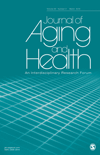
JOURNAL OF AGING AND HEALTH
Scope & Guideline
Elevating discourse on aging and societal health.
Introduction
Aims and Scopes
- Multidisciplinary Research on Aging:
The journal publishes research that integrates various disciplines, including psychology, sociology, public health, and gerontology, to provide a holistic understanding of aging and health. - Health Disparities and Social Determinants:
A significant focus is placed on the impact of social determinants, including socioeconomic status, race, and ethnicity, on the health outcomes of older adults, highlighting disparities in care and access. - Cognitive Health and Functioning:
The journal addresses cognitive aging, including studies on dementia, cognitive impairment, and the relationship between cognitive health and other factors such as physical activity and social engagement. - Quality of Life and Well-Being:
Research on the quality of life of older adults is a core component, exploring factors that contribute to well-being, mental health, and overall life satisfaction among different aging populations. - Impact of Caregiving:
The journal examines the experiences and challenges faced by caregivers of older adults, including the psychological and physical impacts of caregiving responsibilities. - Policy Implications and Interventions:
The journal contributes to the discourse on policies affecting older adults, focusing on interventions that promote healthy aging and improve health outcomes.
Trending and Emerging
- Digital Health and Technology Use:
There is an increasing focus on the role of digital health technologies and telehealth solutions in improving health outcomes and accessibility for older adults, especially highlighted during the COVID-19 pandemic. - Intersectionality in Aging Research:
Emerging studies are emphasizing the importance of intersectionality, exploring how factors such as gender, race, and socioeconomic status interact to affect the health and well-being of older adults. - Mental Health and Aging:
Research on mental health issues among older adults, including depression, anxiety, and the psychological impact of caregiving, has gained prominence, reflecting a growing recognition of mental health as a critical component of overall health. - Resilience and Coping Mechanisms:
There is a trend towards studying resilience and coping strategies among older adults, particularly in the context of adversity such as health challenges, loss, and social isolation. - Global Perspectives on Aging:
An increasing number of studies are adopting a global perspective, examining aging issues across different cultural and national contexts, which enriches the understanding of aging and health worldwide.
Declining or Waning
- Traditional Medical Models of Aging:
Research that primarily addresses aging from a purely medical perspective is declining, as there is a growing recognition of the need for a more holistic approach that incorporates social, psychological, and environmental factors. - Age-Related Stereotypes:
The examination of age-related stereotypes has decreased, possibly overshadowed by more pressing issues such as health disparities and the impact of social determinants on health outcomes. - Single-Factor Models of Health Outcomes:
There is a noticeable decline in studies focusing solely on single-factor models of health outcomes without considering the interplay of multiple factors, such as lifestyle, environment, and social support. - Generic Interventions Without Tailoring:
The journal has published fewer studies on generic health interventions that do not consider the specific needs and contexts of diverse aging populations, reflecting a shift towards more tailored and personalized approaches.
Similar Journals

JOURNAL OF GERONTOLOGICAL SOCIAL WORK
Empowering research for a better aging experience.The JOURNAL OF GERONTOLOGICAL SOCIAL WORK, published by Routledge Journals, Taylor & Francis Ltd, serves as a pivotal platform in the multidisciplinary study of gerontology, specifically focusing on social work practices affecting older adults. Since its inception in 1979, the journal has cultivated a robust collection of scholarly articles that address critical issues in aging, incorporating diverse perspectives from nursing, social sciences, and social work disciplines. Currently, the journal holds esteemed rankings within various categories, including Q2 in Nursing (miscellaneous) and Q1 in Social Sciences (miscellaneous), showcasing its influence and relevance in the field. With its high Scopus ranking—#96 out of 604 in Social Sciences and #9 out of 45 in Nursing—this publication is essential for researchers and practitioners aiming to improve service delivery and practices surrounding elderly care. Though not offering open access, its contributions are nonetheless invaluable for fostering scholarly dialogue and advancing knowledge within gerontological social work. The journal's emphasis on evidence-based practice, innovative research methodologies, and policy implications makes it a critical resource for anyone committed to enhancing the lives of older populations.

EXPERIMENTAL AGING RESEARCH
Transforming Understanding of the Aging JourneyEXPERIMENTAL AGING RESEARCH, published by Taylor & Francis Inc., is a leading journal that has been at the forefront of aging research since its inception in 1975. With an ISSN of 0361-073X and an E-ISSN of 1096-4657, this journal has earned a notable reputation, including a Q3 ranking in the field of Aging and impressive Q1 and Q2 rankings in Arts and Humanities and Geriatrics and Gerontology respectively. This positions the journal within the top percentile of its category, highlighting its significant impact and contribution to the scientific community. Covering a broad scope that intersects various disciplines, EXPERIMENTAL AGING RESEARCH aims to disseminate pioneering research, foster interdisciplinary collaboration, and provide a platform for innovative studies that enhance understanding of the aging process. While it currently does not offer Open Access, researchers and academics can access its rich repository of knowledge that spans multiple facets of aging, from physiological changes to psychological impacts. As the field of aging continues to evolve, this journal remains an essential resource for researchers, professionals, and students dedicated to advancing knowledge and practices concerning aging and longevity.

JMIR Aging
Bridging Technology and Geriatric CareJMIR Aging is a premier open-access journal published by JMIR Publications, Inc., dedicated to advancing the field of aging research and geriatric care. Established in 2018, this journal has quickly achieved a reputation for excellence, currently holding a Q1 ranking in several categories, including Geriatrics and Gerontology, Health Informatics, and Health (Social Science), reflecting its high impact and significant contributions to these fields. With a strong focus on innovative research that bridges technology and aging populations, JMIR Aging provides a platform for interdisciplinary collaboration among researchers, healthcare professionals, and students. The journal is indexed in Scopus, where it ranks impressively across various health science categories, underscoring its influence and reach within the academic community. Accessible to all, JMIR Aging plays a vital role in disseminating critical knowledge and fostering discussions that can lead to improved health outcomes for aging individuals worldwide.
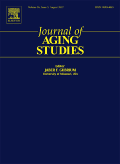
JOURNAL OF AGING STUDIES
Elevating Conversations on Aging DynamicsJOURNAL OF AGING STUDIES is a leading publication dedicated to the interdisciplinary exploration of aging, providing a platform for researchers, professionals, and students interested in the complex dynamics of aging in contemporary society. Published by Elsevier Science Inc, this esteemed journal has established itself as a key resource in various categories, achieving a Q1 ranking in Issues, Ethics and Legal Aspects and a Q2 ranking in multiple health-related disciplines as of 2023. The journal focuses on a broad range of topics, including health policy, social sciences, and life-span studies, contributing significantly to discussions surrounding aging through its rigorous peer-reviewed articles and comprehensive research studies since its inception in 1987. With an ISSN of 0890-4065 and an E-ISSN of 1879-193X, it serves as an essential reference for academic and professional audiences, and remains committed to advancing knowledge and policy in the field of aging.
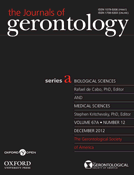
JOURNALS OF GERONTOLOGY SERIES A-BIOLOGICAL SCIENCES AND MEDICAL SCIENCES
Exploring Innovations in Aging and Health CareJournals of Gerontology Series A: Biological Sciences and Medical Sciences, published by Oxford University Press Inc, stands at the forefront of aging research, bridging the gap between biological sciences and medical practices to address the complexities of gerontology. With an impressive impact factor reflecting its significant contribution to the field, this journal is recognized within the Q2 quartile in Aging and the Q1 quartile in Geriatrics and Gerontology for 2023, evidencing its high-quality scholarship and relevance. Researchers and professionals will find valuable insights through its comprehensive coverage of aging-related topics, informed by cutting-edge studies ranked among the top in their category—Rank #11 in Geriatrics and Gerontology and Rank #9 in Aging on Scopus. The journal aims to disseminate innovative research that can impact health care practices and enhance the quality of life in older populations. For those engaged in studies of aging, this journal offers a vital platform for sharing knowledge and advancing the understanding of biological and medical sciences as they pertain to gerontology.

Ageing International
Advancing Knowledge in Gerontology and Aging StudiesAgeing International, published by SPRINGER, is a distinguished journal that has been at the forefront of scholarly research in the field of gerontology and aging studies since its inception in 1974. With an ISSN of 0163-5158 and an E-ISSN of 1936-606X, this journal provides a platform for high-quality, peer-reviewed articles that address the multifaceted aspects of aging on both individual and societal levels. Recognized as a Q2 category journal in Health (social science) for 2023, Ageing International plays a critical role in disseminating knowledge that influences practice, policy, and future research directions in the ever-evolving landscape of aging. Researchers, professionals, and students will find this journal indispensable for staying current with cutting-edge analyses and discussions, as it holds a Scopus rank of #168 in the social sciences realm, placing it within the 54th percentile of its category. Although it does not offer an open-access model, its extensive archive and ongoing contributions to the literature make it essential reading for anyone engaged in understanding the challenges and opportunities of aging in society. The editorial office is located at ONE NEW YORK PLAZA, SUITE 4600, NEW YORK, NY 10004, UNITED STATES, further emphasizing its dedicated presence in the academic community.

Journal of Aging Research
Pioneering studies for a healthier, aging society.The Journal of Aging Research, an esteemed publication under the auspices of HINDAWI LTD, has been a cornerstone for the dissemination of research in the field of aging since its inception in 2010. With an impact factor reflective of its significance in the discipline, this journal is categorized in the 3rd quartile (Q3) for Geriatrics and Gerontology, and ranks 43rd out of 116 in its field according to Scopus rankings, positioning it in the 63rd percentile for quality research. The journal operates with a fully Open Access model, ensuring that all published articles are freely available to researchers, practitioners, and the broader public, expanding the reach and impact of scholarly work. Set to converge from 2010 to 2024, the journal is dedicated to advancing the understanding of the aging process through rigorous research, comprehensive reviews, and innovative insights, making it an invaluable resource for anyone involved in the study or practice of geriatric health care and related disciplines.
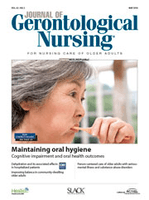
Journal of Gerontological Nursing
Elevating Standards in Elder CareThe Journal of Gerontological Nursing, published by SLACK INC, is a leading peer-reviewed journal dedicated to advancing the field of gerontological nursing through innovative research, clinical practice, and educational advancements. Since its inception in 1975, this journal has become a crucial resource for researchers, healthcare professionals, and students interested in the care and management of older adults. With an impact factor that reflects its significance within the disciplines of gerontology and nursing (Category Quartiles: Q3 in Gerontology and Q3 in Nursing), it serves as a platform for disseminating vital findings, best practices, and evidence-based approaches aimed at improving the quality of life for the aging population. While the journal maintains a print-only format, its content is invaluable for those looking to stay ahead in the rapidly evolving landscape of gerontological care. As it continues to publish until 2024, the Journal of Gerontological Nursing invites contributions that foster dialogue and innovation within this essential area of healthcare.
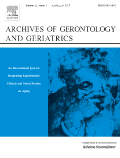
ARCHIVES OF GERONTOLOGY AND GERIATRICS
Empowering research for a healthier aging society.The Archives of Gerontology and Geriatrics, published by Elsevier Ireland Ltd, is a leading journal in the fields of Aging and Geriatrics and Gerontology. With an ISSN of 0167-4943 and an E-ISSN of 1872-6976, it has established itself as a crucial platform for disseminating high-quality research focused on the biological and psychosocial aspects of aging. The journal holds an impressive Q2 ranking in both Aging and Geriatrics and Gerontology, and a Q1 ranking in Gerontology and Health (Social Science) as of 2023, reflecting its significant impact in these disciplines. Additionally, the journal is ranked #33/371 in Social Sciences (Health) and #5/39 in Nursing (Gerontology) according to Scopus, showcasing its esteemed position in the academic community. Although currently not open access, the journal offers a wealth of research articles from 1982 to the upcoming 2025 that are vital for stakeholders including researchers, healthcare professionals, and students aiming to advance their understanding of aging processes and policies. Titles published within its pages contribute to shaping agendas in public health and gerontological practice, making it an essential resource for those involved in the study of the elderly population.
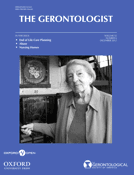
GERONTOLOGIST
Connecting Scholars to Enhance Aging ResearchThe GERONTOLOGIST, published by Oxford University Press Inc, is a premier journal in the field of geriatrics and gerontology, with a distinguished history since its inception in 1961. This esteemed journal stands out with its impressive Q1 rankings in prominent categories, including Geriatrics and Gerontology, reflecting its vital role in disseminating innovative research and advancing knowledge within these critical disciplines. With an impact factor that ranks it among the top journals in both Nursing Gerontology and Medicine, the GERONTOLOGIST serves as a key resource for researchers, professionals, and students dedicated to enhancing the health and well-being of older adults. Although it operates under a traditional access model, the journal remains committed to publishing cutting-edge studies that address the complexities of aging and inform evidence-based practices. By fostering a rich dialogue among scholars and practitioners, the GERONTOLOGIST is instrumental in shaping the future of gerontological research and policy.